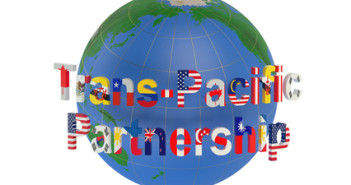12 countries, most notably the US and Japan, signed in principle on the Trans Pacific Partnership (TPP) agreement, that is expected to enhance trade within a region where 40% of world trade already takes place.
While we don’t officially know what is inside this secret agreement, it certainly has political impact for Japan. But this may go both ways.
USD/JPY has been one of the most frustrating currency pairs of late, hugging the 120 level and remaining amazingly stable in comparison to movements in other currencies. Speculation about the timing of the first rate hike from the Federal Reserve and the potential of further Quantitative Easing (QE) from Japan have been suspiciously ignored by markets.
Yet the longer this stall in prices continues, the larger the potential move. Is the yen set to weaken or strengthen? This massive trade agreement can certainly make the difference.
Why the JPY could strengthen on TPP
The argument for an appreciation of the yen goes as follows: Japan needs this agreement more than any other country, to boost its exports and also to stir the local economy, including with more consumption.
As the secretive deal was signed in principle, it needs to be ratified by national parliaments, including the ever polarized US Congress. And Congress is not detached from the presidential primaries.
In both Democrat and Republican camps, there has been criticism on the agreement from the leading candidates. Hillary Clinton showed reservations regarding the deal with concerns on about workers’ rights. And Donald Trump always promises he can get a better deal.
If the Bank of Japan introduces new monetary stimulus via a third round of QQE (after moves in April 2013 and October 2014), this would consequently weaken the yen.
And what happens when China and Japan see their currencies weaken? US politicians jump and call foul, labeling the second and third largest global economies as currency manipulators. Curiously they never said anything about Switzerland’s outright peg and seem to ignore the effect of the 3 Made in America QE programs that have hit the dollar hard.
So, a move by the BOJ to weaken the yen could risk the ratification of TPP, something that Japan would not want to risk. Therefore, the BOJ is likely to refrain from action.
And now to the opposite argument:
Why the JPY would weaken on the TPP
The reasons to introduce more monetary stimulus from BOJ Governor Kuroda are obvious: the Japanese economy is on the verge of another recession and the 2% inflation target within 2 years is out of reach. Japan’s core inflation measures (excluding oil prices) is hardly at 1% given the most favorable measures, and this is after 2.5 years of immense efforts.
A third move, to come in October 2015, would help in achieving the target by enabling more loans and by the weaker yen: more export growth and higher inflation via imported goods.
What happened in previous rounds? In April 2013, Kuroda’s initial huge QQE program was a big shock, but it didn’t stand on its own: Shinzo Abe’s government had already introduced stimulus of its own, helping in part recover from the 2011 natural disaster.
In October 2014, the background was recession Japan had entered due to the hike in the sales tax back in April that year. And the BOJ certainly came into play. Yet once again, the BOJ didn’t act on its own: the move was accompanied by a massive reform to the pension investment scheme. Japan’s GPIF was allowed to broaden its asset portfolio, boosting stocks.
The one-two punch had a huge negative effect on the yen.
So, if we draw from the past, this significant achievement from the Japanese government, the TPP, will have served as fiscal stimulus. Even if the actual implementation of the deal could take quite some time, the expectations could already have a stimulative impact.
More importantly, this would serve as the government’s share in stimulus, passing the ball to the court of the BOJ, and allowing it to act on October 30th, introducing more QE and weakening the yen.
So what will it be? The reason for more action
Will the BOJ introduce a third round of QE later this month and hit the yen hard or refrain from action?
The tendency goes towards more action. First, the government did its share and BOJ feels obliged to reach its inflation goal.
But what about the TPP ratification? Abe, Kuroda and everybody else can probably rely on US politicians to eventually do what they do: vote for free trade
There are numerous questions about the degrees of freedom the TPP really allows, but there is hardly any doubt that US corporations had their say in crafting the agreement, and will probably have the upper hand in having the agreement ratified, with massive lobbying efforts.
So, the BOJ can proceed with its stimulus and send the yen lower.
What do you think?
More:
- BOJ likely to introduce QE3 In Late October – Credit Agricole
- BoJ Could Have A Halloween Trick In Store For Markets – CIBC
